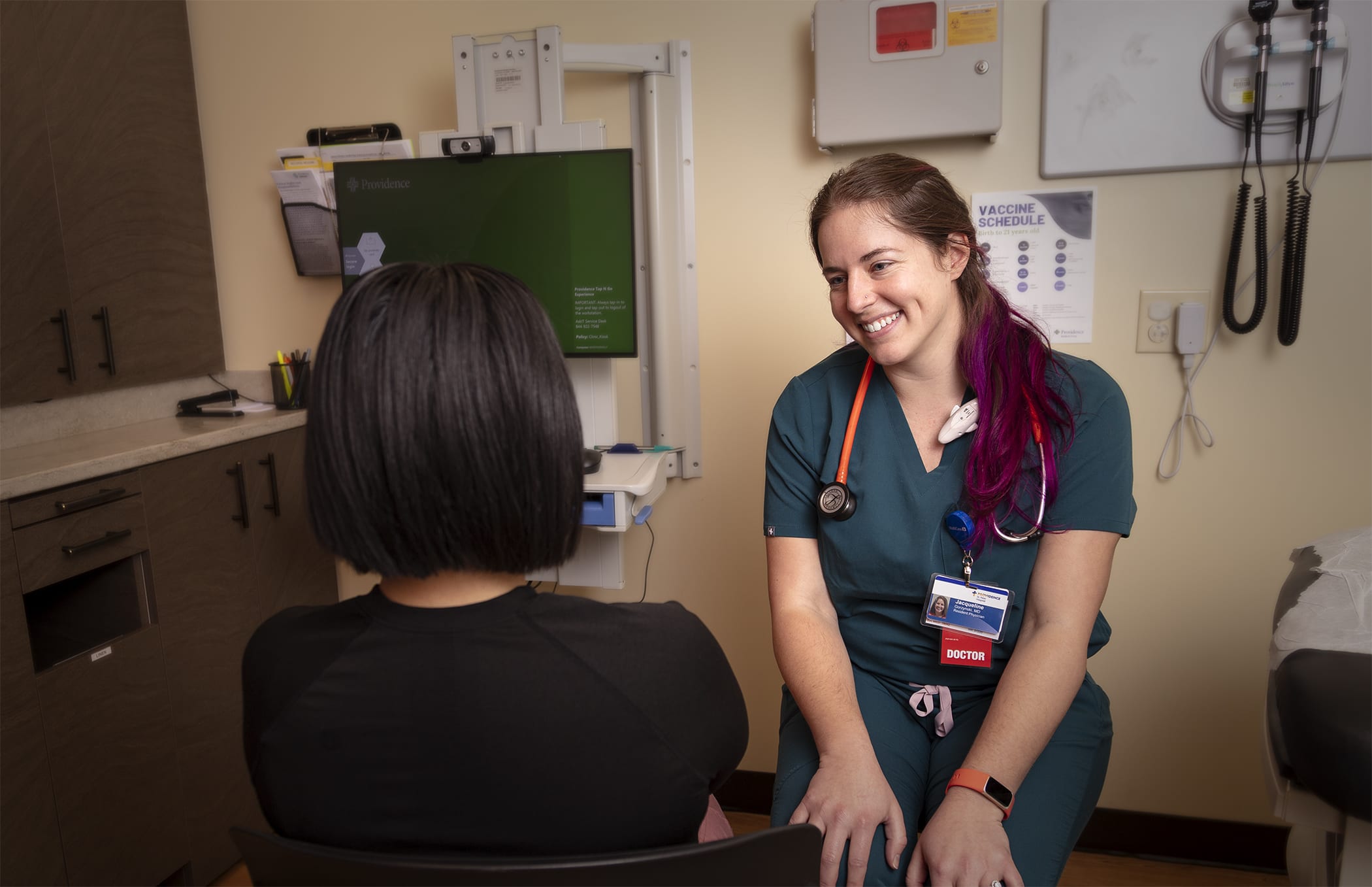Healing for people affected by mental health and substance use challenges
Removing barriers to care | Mental health and substance use
Mental health and substance use challenges are widespread, spanning the country, and in some areas are at crisis levels. These complex medical conditions are often stigmatized and any available resources might not be clear or easy to navigate. Providence is making investments designed to remove these barriers to care through a proactive, compassionate, and individualized approach. In 2021, our family of organizations supported programs that are making a difference for people struggling to overcome these burdens.
Work2BeWell: Connecting youth to mental health resources
Providence believes that teens’ mental health and emotional well-being is a critical priority, especially with the ongoing impacts of the pandemic. Our digital wellness initiative, Work2BeWell, provides more than 300 clinically-vetted mental health education resources online, conducts suicide awareness campaigns on social media, and trains teens and adults to recognize and respond to mental health crises.
Work2BeWell focuses on partnership with students, educators and health care workers to deliver these resources. Its National Advisory Council, a group of committed high school students, helps schools and communities prioritize mental health by recommending curriculum for mental health topics affecting their peers. The council grew from 18 students in 2020 to 30 students across 10 states and four time zones in 2021.
In 2021, Work2BeWell launched Emotionally Connect, Partner, and Respond, or ECPR training, which is a three-step response to a crisis. The curriculum covers many topics related to youth mental illness including how common it is, warning signs, and how to connect people with resources. Work2BeWell coordinated with Providence to equip all athletic trainers in Oregon, Washington, and California with ECPR training. According to Work2BeWell Director Jawanza Hadley, when the program training was also offered to Providence caregivers through a wellness app, more than 5,000 signed up on the first day.
Providence is investing to remove barriers to care and support for those struggling with mental health challenges, especially our youth.
In 2021, Work2BeWell and Providence launched a digital outreach strategy to meet those in need where they are—on social media. Online intercepts enabled the program to connect struggling individuals with resources and support. Hadley shared that, by partnering with influencers and organizations to spread mental health awareness and share valuable resources, the campaign reached even more people, earning 105 million impressions, 10.6 million engagements, and a 140 percent increase in web traffic.
Montana: A Journey of Hope for pregnancy
In Lake County, a Providence program is designed to identify early complications from substance use and pregnancy, and then supports patients and newborns on a path toward recovery. More than five years in the making, Journey of Hope (formerly Wrapped in Hope) combines pre-and post-natal screenings, lactation clinic services, and pediatric interventions with behavioral health and trauma-informed care to support parents and infants with health issues caused by substance use. It also offers postpartum support.
Providence created a Journey of Hope after identifying a need in the community, and in particular, a gap in services of concern to the local Indigenous communities, including the Bitterroot Salish, Upper Pend d’Oreille, and Kootenai tribes. In 2021, nearly one-quarter of deliveries presented either positive maternal drug screenings or positive infant drug screenings.
“We want to get to the point where this is the care patients expect and deserve, regardless of their choices. They should have the healthiest pregnancy possible.” - Lisa Grainey, RN, AMB-BC, CLC, chronic care manager, Journey of Hope
The program identifies participants through provider referrals from OB/GYNs, pediatricians or representatives from Child Protective Services. It also partners with Child Protective Services and Tribal Health to coordinate and deliver resources to patients. When patients begin the program, they learn what to expect, receive information about the program and their options, and get connected with a supportive community.
Through a combination of funding from Providence’s health equity initiative, state funding and a Meadowlark grant, the program increased capacity to conduct more substance use screenings which created additional opportunities to intervene, direct resources and provide treatment.
Lisa Grainey, RN, AMB-BC, CLC, is a chronic care manager leading the program, and she hopes to hire a community health worker to increase community outreach for the program. “We want to get to the point where this is the care patients expect and deserve, regardless of their choices. They should have the healthiest pregnancy possible,” says Grainey.
Northern California: Partnership reduces stigma and cares for each person
In Humboldt County, Providence takes a compassionate approach to care for birthing women and people experiencing substance use challenges. The number of people affected by this condition is three times higher in this county than the state’s average, and due to its complexity, Providence and regional organizations made a coordinated effort to find solutions.
Through a partnership that began in 2017 between Providence, Humboldt County Public Health Department, North Coast Health Improvement and Information Network, and the California Center for Rural Policy at Cal Poly Humboldt, Humboldt RISE (Resilience and Inclusion through Support and Empowerment) was created. The project creates pathways for patients experiencing substance use disorder to receive treatment, tools, support and empowerment for success.
Humboldt RISE is a collaborative in Northern California that creates pathways for patients experiencing substance use disorder to receive treatment, tools, support and empowerment for success.
The collaborative focuses on understanding and de-stigmatizing perinatal substance use disorder through personalized care. Patients are asked initial screening questions about their substance use history and pregnancy, which helps caregivers create a tailored care plan. This might include residential treatment programs, substance use education, and mental health counseling.
Texas: Covenant counseling center meets growing mental health needs
The Covenant Community Counseling Center in Lubbock, Texas, provides vital mental health services in a historically under-served area at no or low cost to the patients. Services include individual and family counseling (both in-person and virtual) and free monthly consultations for people seeking care.
In 2021, Covenant Health in Lubbock, Texas, dedicated $370,000 in community benefit to deliver 1,744 counseling sessions and consultations to vulnerable people.
As the COVID-19 pandemic took its toll on the community, especially youth, the demand for mental health services increased in 2020 and 2021. In addition to the counseling center, Covenant Health partners with the Texas Tech University Community Advocacy for Students program to provide wraparound services to at-risk students and families through the local school system.
Mental health and substance use disorders are often stigmatized which can discourage or prevent people from seeking help. When they do reach out, systems and resources are often underfunded and difficult to access, further distancing patients from the tools and support they need. With programs designed to identify and reduce these challenges in a compassionate and personal way, Providence is helping break the stigma and care for highly vulnerable patients.



